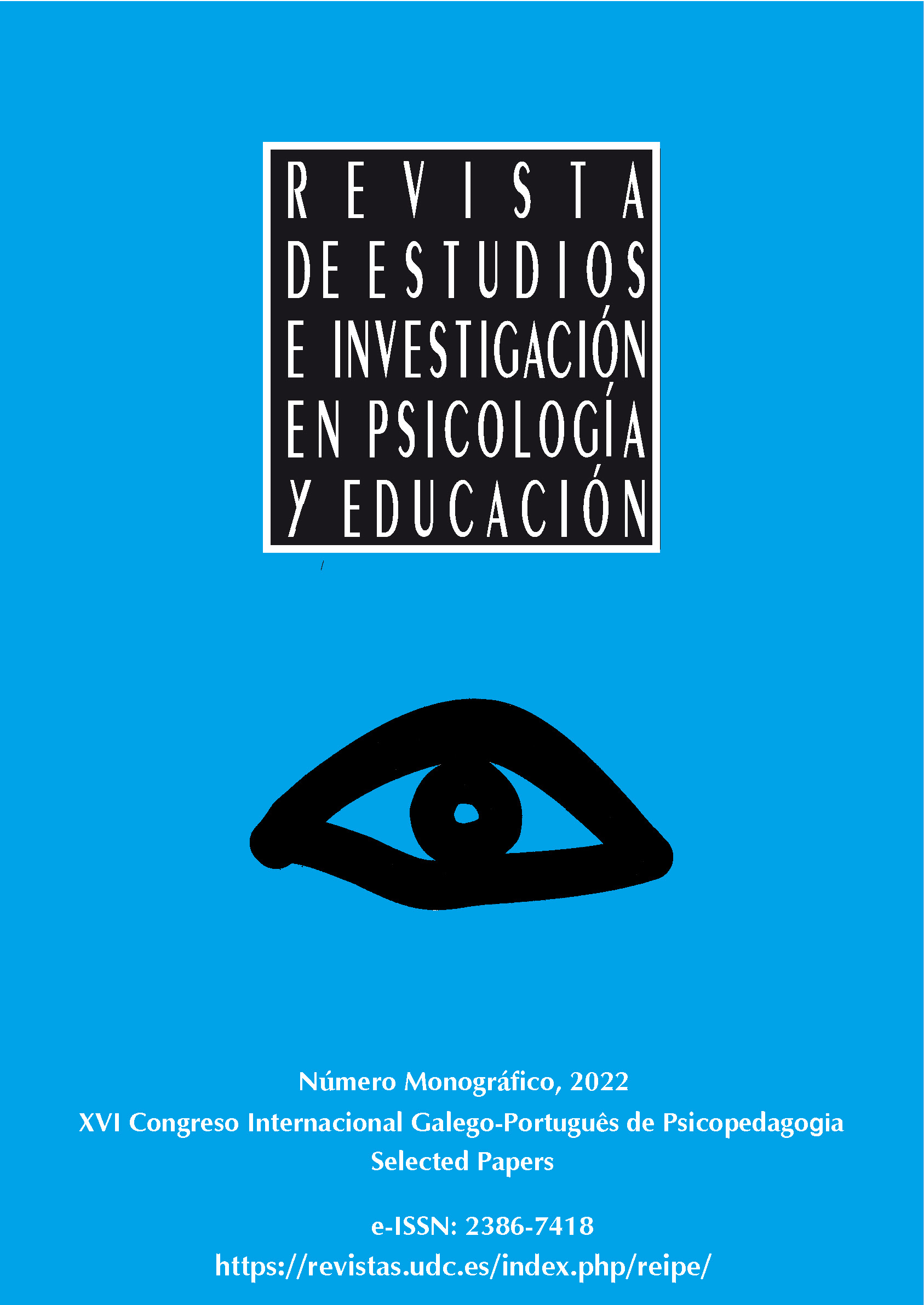Cyber dating abuse: What is the relationship with moral sensitivity in a sample of university students?
Main Article Content
Abstract
The present investigation sought to explore the relationship between cyber dating abuse and ethical sensitivity in a sample of university students. The sample consisted of 239 university students aged between 17 and 49 years (M = 21.50; SD = 4.70). The Ethical Sensitivity Scale (ESS), the Cyber Dating Abuse Questionnaire (CDAQ) and a sociodemographic questionnaire were used as instruments. The main results suggest that there are differences in terms of gender in the dimensions: Reading and expressing emotions, Taking the perspective of others, Caring by connecting to others and Generating interpretations and options, with females, in general, showing higher levels when compared with males. Regarding the variable cyber dating abuse, statistically significant differences were found according to gender in the victimization – direct aggression and in the perpetration – direct aggression, with males scoring higher than females in both dimensions. There were also significant negative correlations between dimensions of cyber abuse and dimensions of ethical sensitivity. Regarding the results, the implementation of intervention programs aimed to the development of skills linked to ethical sensitivity is considered extremely relevant, as these seem to allow the development of pro-social behaviour, thus contributing to the reduction of deviant behaviour.
Keywords:
Downloads
Article Details
References
Azevedo, M. C. (2019). Ethical Sensitivity Scale (Unpublished manuscript). Departamento de Educação e Psicologia, Universidade de Trás-os-Montes e Alto Douro.
Bandura, A. (1999). Moral disengagement in the perpetration of inhumanities. Personality and Social Psychology Review, 3(3), 193-209. https://doi.org/10.1207/s15327957pspr0303_3
Bennett, D. C., Guran, E. L., Ramos, M. C., & Margolin, G. (2011). College students' electronic victimization in friendships and dating relationships: Anticipated distress and associations with risky behaviors. Violence and Victims, 26(4), 410-429. https://doi.org/10.1891/0886-6708.26.4.410
Borrajo, E., Gámez-Guadix, M., & Calvete, E. (2015a). Cyber dating abuse: Prevalence, context, and relationship with offline dating aggression. Psychological Reports: Relationships & Communications, 116(2), 565-585. https://doi.org/10.2466/21.16.PR0.116k22w4
Borrajo, E., Gámez-Guadix, M., Pereda, N., & Calvete, E. (2015b). The development and validation of the Cyber Dating Abuse Questionnaire among young couples. Computers in Human Behavior, 48, 358-365. https://doi.org/10.1016/j.chb.2015.01.063
Caridade, S. M., & Braga, T. (2019). Versão portuguesa do Cyber Dating Abuse Questionaire (CDAQ) – Questionário sobre Ciberabuso no Namoro (CibAN): Adaptação e propriedades psicométricas. Análise Psicológica, 1(36), 93-105. https://doi.org/10.14417/ap.1543
Cuadrado-Gordillo, I., & Fernández-Antelo, I. (2019). Analysis of moral disengagement as a modulating factor in adolescents’ perception of cyberbullying. Frontiers in Psychology, 10, 1-12. https://doi.org/10.3389/fpsyg.2019.01222
Cuadrado-Gordillo, I., Fernández-Antelo, I., & Parra, M. G. (2020a). Moral disengagement as a moderating factor in the relationship between the perception of dating violence and victimization. International Journal of Environmental Research and Public Health, 17, 1-14. https://doi.org/10.3390/ijerph17145164
Cuadrado-Gordillo, I., Fernández-Antelo, I., & Parra, M. G. (2020b). Moral development in adolescents as a key indicator for the prevention of violent behavior in their couples’ relationships. European Journal of Teaching and Education, 2(3), 50-58. https://doi.org/10.33422/ejte.v2i3.494
Cutbush, S., Williams, J., Miller, S., Gibbs, D., & Clinton-Sherrod, M. (2018). Longitudinal patterns of electronic teen dating violence among middle school students. Journal of Interpersonal Violence, 00(0), 1-21. https://doi.org/10.1177/0886260518758326
Durán, M., & Martínez-Pecino, R. (2015). Ciberacoso mediante teléfono móvil e internet en las relaciones de noviazgo entre jóvenes. Comunicar, 22(44), 159-167. https://doi.org/10.3916/C44-2015-17
Espinosa-Pike, M., Aldazabal, E., & Martín-Arroyuelos, A. (2012). Influence of gender and ethical training on university teachers sensitivity towards the integration of ethics in business studies. Journal of Academic Ethics, 10, 9–25. https://doi.org/10.1007/s10805-012-9151-x
Gilligan, C. (1982). In a different voice: Psychological theory and women’s development. Harvard University Press.
Golami, K., & Tirri, K. (2012). The cultural dependence of the Ethical Sensitivity Scale questionnaire: The case of Iranian Kurdish teachers. Education Research International, 1-10. https://doi.org/10.1155/2012/387027
Hinduja, S., & Patchin, J. W. (2020). Digital dating abuse among a national sample of U.S. youth. Journal of Interpersonal Violence, 00(0), 1-21. https://doi.org/10.1177/0886260519897344
Hood, M., & Duffy, A. L. (2018). Understanding the relationship between cyber-victimisation and cyber-bullying on social network sites: The role of moderating factors. Personality and Individual Differences, 133, 103-108. https://doi.org/10.1016/j.paid.2017.04.004
Kohlberg, L. (1974). Education, moral development and faith. Journal of Moral Education, 4(1), 5-16. https://doi.org/10.1080/0305724740040102
Machimbarrena, J. M., Calvete, E., Fernández-González, L., Álvarez-Bardón, A., Álvarez-Fernández, L., & González-Cabrera, J. (2018). Internet risks: An overview of victimization in cyberbullying, cyber dating abuse, sexting, online grooming and problematic internet use. International Journal of Environmental Research and Public Health, 15(11), 1-15. https://doi.org/10.3390/ijerph15112471
Marôco, J. (2018). Análise estatística com o spss statistics (7ª Ed.). ReportNumber.
Peterson, J., & Densley, J. (2017). Cyber violence: What do we know and where do we go from here? Aggression and Violent Behavior, 34, 193-200. https://doi.org/10.1016/j.avb.2017.01.012
Rest, J. R. (1984). Background: Theory and research. In J. R. Rest & D. Narváez (Eds.), Moral development in the professions: Psychology and applied ethics (pp. 1-26). Lawrence Erlbaum Associates, Inc.
Sánchez-Jiménez, V., & Muñoz-Fernández, N. (2021). When are sexist attitudes risk factors for dating aggression? The role of moral disengagement in Spanish adolescents. International Journal of Environmental Research and Public Health, 18, 1-14. https://doi.org/10.3390/ijerph18041947
Stankovska, G., Dimitrovski, D., Memedi, I., & Ibraimi, Z. (2019). Ethical sensitivity and global competence among university students. In N. Popov et al. (Eds.), Global education in practice: Teaching, researching, and citizenship. Bulgarian Comparative Education Society.
Tirri, K., & Nokelainen, P. (2011). Ethical Sensitivity Scale. In K. Tirri & P. Nokelainen (Eds.), Measuring multiple intelligences and moral sensitivities in education (pp. 59-76). Sense Publishers.
Wolford-Clevenger, C., Brasfield, H., Febres, J., Elmquist, J., Brem, M., & Shorey, R. C. (2015). An examination of the Partner Cyber Abuse Questionnaire in a college student sample. Psychology of Violence, 6(1), 156-162. https://doi.org/10.1037/a0039442
Zweig, J. M., Dank, M., Yahner, J., & Lachman, P. (2013). The rate of cyber dating abuse among teens and how it relates to other forms of teen dating violence. Journal of Youth Adolescence, 42, 1063-1077. https://doi.org/10.1007/s10964-013-9922-8



